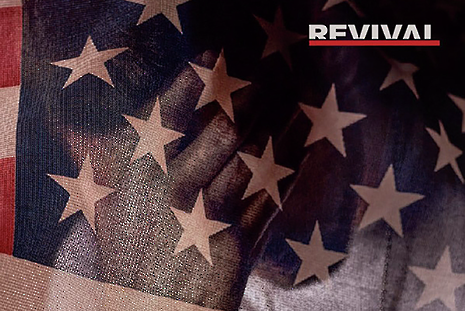Eminem Revival review: ‘throwing shit at the wall and watching most of it fail to stick’
Joe Court is underwhelmed by Eminem’s jarring new album that, despite its political tone, fails to hit the mark

Revival neatly signposts its main flaw in its first two, highly self-conscious tracks: the Beyoncé collaboration ‘Walk On Water’ is about Eminem’s fear of disappointing the fans, unexciting but sweet enough, while ‘Believe’ throws away all the previous five minutes’ humility and vulnerability in an overcompensatory ‘Still Got It’ track that nonetheless fails to prove that he has. The problem is not the album’s tonal inconsistency – indeed, the unpredictable mix of Marshall Mathers with his Eminem and Slim Shady personae has always been key to the freshness and variety of his – but rather the insecurity, clear from the 45-year-old Eminem’s flow in these tracks, about the sort of music he ought to be making now, where some confident direction could have been a saving grace. On a repeat listen to the album, ‘Walk On Water’ felt like a disclaimer, a warning, even an apology for what was to come.
In terms of subject matter, Revival is a case of somewhat desperately throwing shit at the wall and watching most of it fail to stick. It’s Mathers’ most socially conscious album, but the commentary is largely limited to personal digs at President Trump (e.g. “he looks like a canary with a beak” on ‘Like Home’) which, though probably intended to show how much Eminem has grown out of his ‘Just Don’t Give a Fuck’ youth, are regardless no less immature. The most interesting of the political tracks is ‘Untouchable’, in which he takes on racist police brutality, villainising white cops on one side with jeering voice and nasty guitar, and championing the black victims - into whose identity he inserts himself, with good intentions though rather presumptuously, by way of ‘we’ and ‘us’ – on the other. Subtlety has never been one of Eminem’s most pressing concerns, but a little of it may have helped tracks like this prompt the meaningful discussion he is clearly encouraging.
“Limp choruses and dull samples complement droned verses filled with jarring wordplay”
Mathers hasn’t lost the will to shock, but without his trademark fearless humour to accompany them (this having been largely replaced in Revival by insidious, lame puns), this time around his most violent tracks just make for uncomfortable listening. ‘Offended’ defends his right to produce just that response, but isn’t entertaining enough to persuade that that right is worth defending, while in ‘Framed’ that old Eminem chestnut of violence against women neither evokes the guilty laughs it does in ‘My Name Is’ nor conveys the raw emotion of ‘Kim’s Revenge Fantasy’. (Mathers’ - or Slim’s, depending on how much leeway you grant him – notorious misogyny is worn as openly as ever: in ‘Heat’ he goes so far as to endorse Trump’s pussy-grabbing comment.) The bulk of the other songs concern Mathers’ largely infelicitous relationships; aside from being rather samey and overdone, these exhibit the very worst of Revival’s stylistic choices: limp choruses and dull samples complement droned verses filled with jarring wordplay.
The hooks, delivered mostly lifelessly and by token pop stars, establish their songs’ mediocrity early on, several featuring some permutation of the doomed-relationship-as-burning-wreck metaphor ripped straight from the only slightly better ‘Love the Way You Lie’ (though the trite solidarity anthem ‘Nowhere Fast’ applies the imagery to terror attacks for some variety). The backing beats tend towards cheesy pop balladry, outdated power rock, or utterly bland trap; there is nothing careful in the mixing or playful in the sample selection, doubtless a contributing factor to Revival’s near-complete lack – despite its pop leanings – of any tune I can imagine catching on.
“Eminem’s delivery is as joyless as it is unenjoyable to listen to”
Eminem’s delivery is as joyless as it is unenjoyable to listen to: whether confessing his guilt over a one-night stand in ‘River’ or bigging up his writing in ‘Chloraseptic’, his rap sounds as if it were pushed out under duress, the usual anger in his voice coming off as resentment at having to perform, not emotional involvement in the content of the lyrics. In addition, rather than maintaining a consistent flow, he now likes to distribute word stress as a stream of build-ups to entirely disappointing climaxes – mostly weak, juvenile puns. The puns were an issue with his previous few albums too but are perhaps at their worst, and most numerous, in Revival, even finding their way into the supposedly serious subject matter. The otherwise earnest couple problems ballad ‘Need Me’ substitutes “that Egyptian river” for “denial”, a joke I think I’ve seen in a Christmas cracker. Mathers is undoubtedly an expert at finding homophones and double entendres, and his lyrics are hugely impressive in technical terms; if only he were to turn his linguistic talents to filling their emotional hollowness, or finding wordplay to facilitate his flow, not disrupt it.
While not free from the curse of poor hooks and beats, the final tracks, ‘Castle’ and ‘Arose’, are lyrically the album’s best, giving us the background to Mathers’ near-lethal 2007 drug overdose then showing his life flashing before his eyes on a hospital bed. His apologies to his loved ones across these two are well-articulated and ring true; the puns, if not removed, are mercifully kept to a minimum, and ‘Arose’s’ triumphant rewriting of ‘Castle’s’ bleak ending is a neat conclusion for the album. Lyrically solid though they may be, however, these tracks are still a far cry from the rapper’s inventive best; instead, they are just two last gasps of life at the end of this failed Revival
 News / Judge Business School advisor resigns over Epstein and Andrew links18 February 2026
News / Judge Business School advisor resigns over Epstein and Andrew links18 February 2026 News / Gov grants £36m to Cambridge supercomputer17 February 2026
News / Gov grants £36m to Cambridge supercomputer17 February 2026 News / CUCA members attend Reform rally in London20 February 2026
News / CUCA members attend Reform rally in London20 February 2026 News / Union speakers condemn ‘hateful’ Katie Hopkins speech14 February 2026
News / Union speakers condemn ‘hateful’ Katie Hopkins speech14 February 2026 News / Hundreds of Cambridge academics demand vote on fate of vet course20 February 2026
News / Hundreds of Cambridge academics demand vote on fate of vet course20 February 2026










